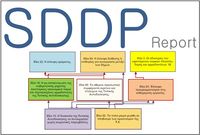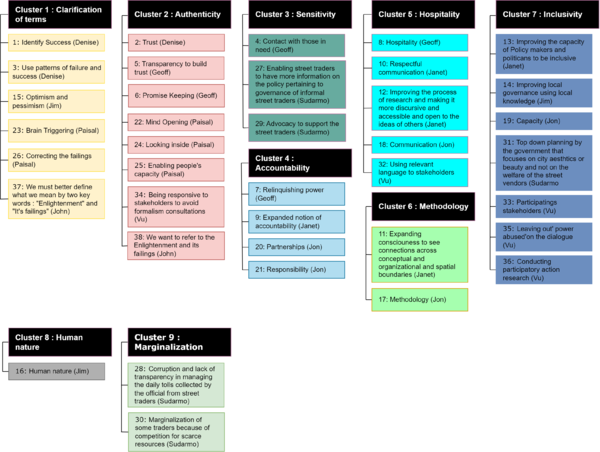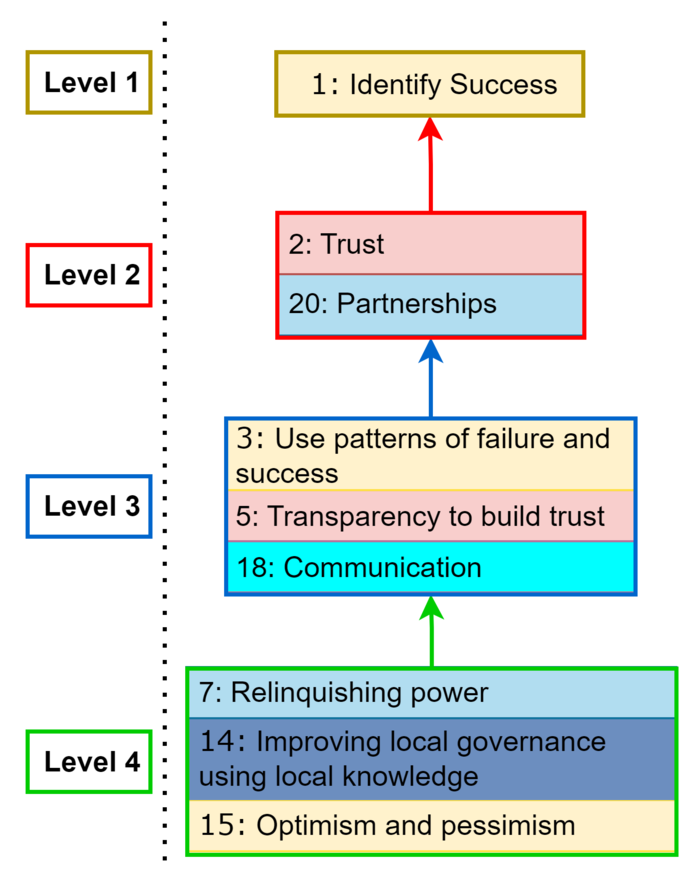Planetary Dialogue SDDP on Rescuing the Enlightment: Difference between revisions
(change of template) |
VishvathaR (talk | contribs) (Updated the text about cluster) |
||
| (12 intermediate revisions by 2 users not shown) | |||
| Line 12: | Line 12: | ||
|editor= [[Janet McIntyre]] | |editor= [[Janet McIntyre]] | ||
|total_duration= 1 week | |total_duration= 1 week | ||
|stats= | |stats=Participants=11 <br> Number of ideas=38 <br>Number of Clusters=9 <br> Ideas received 2+ Votes=14 <br> Ideas with 1 vote=11 <br> Spreadthink=58% <br> Ideas on MAP R=9 | ||
|isbn= | |isbn= | ||
|link= | |link= | ||
}} | }} | ||
==Executive Summary== | |||
World history was made in a synchronous global interactive WebScope Dialogue facilitated by [[Aleco Christakis]] on the island of Crete, supported by [[Yiannis Laouris]] team located on the island of Cyprus on July 21, 2006 (www.loversofdemocracy.org). For the first time, the actual structuring phase of SDDP was implemented using virtual technologies with participants being geographically separated. A group of nine students of “Democracy and The Enlightenment” brought on from the Flinders International <ref>https://www.flinders.edu.au/international</ref>Asia Pacific Institute by [[Janet McIntyre]] in Adelaide, Australia, with other members of the Knowledge Management Team (KMT) spread over various locations in the USA ([[Ken Bausch]], an expert in systems sciences and Marie Kane, an expert in corporate marketing, located at Fayetteville, Georgia, Diane Conway, computer software and internet conference system operator, located at Paoli, Pennsylvania and [[Vigdor Schreibman]], reporter/observer from FINS in Washington DC). | |||
==Triggering Question== | ==Triggering Question== | ||
What factors will help significantly in rescuing the | What factors will help significantly in rescuing the Enlightenment from its failings? | ||
==Clusters== | ==Participants== | ||
Rescuing the Enlightenment was designed as a Global Boundary-Spanning Dialogue, all together in the world of Cyberspace, at different local times and places. Eleven remote participants could view the same screen of the Cogniscope as those in the room using Claripoint, a special software that allows broadcasting a computer screen through the internet. Their virtual presence in the room was made possible using traditional telephone conferencing. | |||
During the week of WebScope Dialogue, between July 14 and July 21, 2006, the KMT guided the student participants in their asynchronous | |||
==Process== | |||
During the first six days, the students generated a set of 49 factors. They subsequently carefully clarified these factors so that everyone understood the meaning of each other’s ideas, using only their e-mail facilities. The factors were then classified into nine clusters and prioritised subjectively by relative importance. The KMT organised all the information efficiently and periodically returned pertinent KMT Reports to the student participants, who were the ‘content-experts’ of the group dialogue so that they could concentrate their attention on producing the content of the dialogue. Then, on the seventh day, the whole group engaged in a synchronous, focused and open dialogue via the WebScope for approximately three hours. At this session, the student group at Adelaide, Australia, guided by the lead facilitator in Crete, with the co-facilitating team in Nicosia, Cyprus and the KMT in Georgia, Pennsylvania and Washington DC, produced a Root-Cause Map (RCM), disclosing the influence tree among factors of higher relevant importance. The production of the RCM enabled the group to discover the root causes of the failures of “Democracy and The Enlightenment”, which could guide future collective, collaborative action. | |||
The RCM disclosed three factors that must be addressed before the recovery of “Democracy and The Enlightenment” could be realised. These are considered the true drivers in the very complex issues the group addresses. The first of these root causes pointed to the '''extremes of either optimism or pessimism''' that guides public administration and political economy. This contrasts with research that shows the significant benefits of policy guidance, not by experts but by ordinary people (see, for example, Yankelovich and Harman, 1988). The second root cause disclosed the '''need for improving local governance by using local knowledge'''. And the third root cause disclosed the '''need to make room for the exercise of power by minorities'''. | |||
Overcoming these three root causes is the key to generating mutual respect and greater trust, which are essential elements of success of any community or society. | |||
According to the final report, the global dialogue communications via telephone conferencing and internet connectivity were subject to local weather disturbances and power outages. These interruptions will require careful monitoring in future applications of the WebScope model to ensure best practices. | |||
In sum, the virtual co-laboratory produced results that the experts considered to be of highest quality and comparable to those that would have been produced in the context of a longer session taking place in a face-to-face physical setting. | |||
==Visual Overview of Clusters== | |||
The participants clustered the 38 ideas into 9 clusters. <br> | |||
The List of Clusters: <br> | |||
Cluster 1: CLARIFICATION OF TERMS<br> | Cluster 1: CLARIFICATION OF TERMS<br> | ||
Cluster 2: AUTHENTICITY<br> | Cluster 2: AUTHENTICITY<br> | ||
| Line 32: | Line 53: | ||
Cluster 9: MARGINALIZATION<br> | Cluster 9: MARGINALIZATION<br> | ||
[[File: Enlightment_Flinders_Clusters_MAP-Clusters.png |thumbnail|center|600px|alt=Clusters]] | |||
The diagram shows the clusters and the ideas that ended up in each category | |||
<br> | |||
==Visual Overview of Mapping== | |||
After voting the following ideas made it to the root of the tree: <br> | |||
Idea 1: Identify success <br> | |||
Idea 2: Trust <br> | |||
Idea 20: Partnerships <br> | |||
Idea 3: Use patterns of failure and success <br> | |||
Idea 5: Transparency to build trust <br> | |||
Idea 18: Communication <br> | |||
Idea 7: Relinquishing power <br> | |||
Idea 14: Improving local governance using local knowledge <br> | |||
Idea 15: Optimism and pessimism <br> | |||
= | [[File:Enlightment_Flinders_2016_MAP.png|thumbnail|center|700px|alt=Influence MAP]] | ||
Latest revision as of 00:12, 22 January 2024
|
Executive Summary
World history was made in a synchronous global interactive WebScope Dialogue facilitated by Aleco Christakis on the island of Crete, supported by Yiannis Laouris team located on the island of Cyprus on July 21, 2006 (www.loversofdemocracy.org). For the first time, the actual structuring phase of SDDP was implemented using virtual technologies with participants being geographically separated. A group of nine students of “Democracy and The Enlightenment” brought on from the Flinders International [1]Asia Pacific Institute by Janet McIntyre in Adelaide, Australia, with other members of the Knowledge Management Team (KMT) spread over various locations in the USA (Ken Bausch, an expert in systems sciences and Marie Kane, an expert in corporate marketing, located at Fayetteville, Georgia, Diane Conway, computer software and internet conference system operator, located at Paoli, Pennsylvania and Vigdor Schreibman, reporter/observer from FINS in Washington DC).
Triggering Question
What factors will help significantly in rescuing the Enlightenment from its failings?
Participants
Rescuing the Enlightenment was designed as a Global Boundary-Spanning Dialogue, all together in the world of Cyberspace, at different local times and places. Eleven remote participants could view the same screen of the Cogniscope as those in the room using Claripoint, a special software that allows broadcasting a computer screen through the internet. Their virtual presence in the room was made possible using traditional telephone conferencing.
During the week of WebScope Dialogue, between July 14 and July 21, 2006, the KMT guided the student participants in their asynchronous
Process
During the first six days, the students generated a set of 49 factors. They subsequently carefully clarified these factors so that everyone understood the meaning of each other’s ideas, using only their e-mail facilities. The factors were then classified into nine clusters and prioritised subjectively by relative importance. The KMT organised all the information efficiently and periodically returned pertinent KMT Reports to the student participants, who were the ‘content-experts’ of the group dialogue so that they could concentrate their attention on producing the content of the dialogue. Then, on the seventh day, the whole group engaged in a synchronous, focused and open dialogue via the WebScope for approximately three hours. At this session, the student group at Adelaide, Australia, guided by the lead facilitator in Crete, with the co-facilitating team in Nicosia, Cyprus and the KMT in Georgia, Pennsylvania and Washington DC, produced a Root-Cause Map (RCM), disclosing the influence tree among factors of higher relevant importance. The production of the RCM enabled the group to discover the root causes of the failures of “Democracy and The Enlightenment”, which could guide future collective, collaborative action.
The RCM disclosed three factors that must be addressed before the recovery of “Democracy and The Enlightenment” could be realised. These are considered the true drivers in the very complex issues the group addresses. The first of these root causes pointed to the extremes of either optimism or pessimism that guides public administration and political economy. This contrasts with research that shows the significant benefits of policy guidance, not by experts but by ordinary people (see, for example, Yankelovich and Harman, 1988). The second root cause disclosed the need for improving local governance by using local knowledge. And the third root cause disclosed the need to make room for the exercise of power by minorities.
Overcoming these three root causes is the key to generating mutual respect and greater trust, which are essential elements of success of any community or society.
According to the final report, the global dialogue communications via telephone conferencing and internet connectivity were subject to local weather disturbances and power outages. These interruptions will require careful monitoring in future applications of the WebScope model to ensure best practices.
In sum, the virtual co-laboratory produced results that the experts considered to be of highest quality and comparable to those that would have been produced in the context of a longer session taking place in a face-to-face physical setting.
Visual Overview of Clusters
The participants clustered the 38 ideas into 9 clusters.
The List of Clusters:
Cluster 1: CLARIFICATION OF TERMS
Cluster 2: AUTHENTICITY
Cluster 3: SENSITIVITY
Cluster 4: ACCOUNTABILITY
Cluster 5: HOSPITALITY
Cluster 6: METHODOLOGY
Cluster 7: INCLUSIVITY
Cluster 8: HUMAN NATURE
Cluster 9: MARGINALIZATION
The diagram shows the clusters and the ideas that ended up in each category
Visual Overview of Mapping
After voting the following ideas made it to the root of the tree:
Idea 1: Identify success
Idea 2: Trust
Idea 20: Partnerships
Idea 3: Use patterns of failure and success
Idea 5: Transparency to build trust
Idea 18: Communication
Idea 7: Relinquishing power
Idea 14: Improving local governance using local knowledge
Idea 15: Optimism and pessimism


